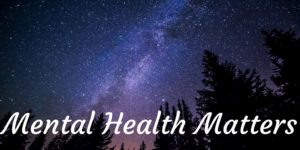Mental Health Matters. Well, of course it does. Those of us who work in the field of mental health, even non-professionals such as me, or those who are only on the periphery of the topic, would find little to argue with the premise that “Mental Health Matters.” There are numerous statistics that remind us of both how far we have come in the field of mental health and how far we must go to address critical issues that impact the lives of community members.
1 in 5 of us experience a mental health or substance use disorder each year; over one million Coloradans each year and their families, loved ones, friends and communities are impacted. Of those one million residents, only 400,000, or two in five, will receive care and treatment.
When asked in national polls why individuals do not seek services, over half say it is because they could not afford the cost. One third said that they did not know where to get services, and another third said that they thought they could handle the problems on their own. Significantly, 1 out of 7 of the individuals said that they were concerned about the stigma associated with mental illness—that neighbors or community would have a negative opinion, that it might have a negative effect on their job or they were concerned about confidentiality.
Not getting mental health treatment and suffering in silence can have devastating consequences. In Colorado, over 1,100 individuals died by suicide in 2016. Since 2016, San Miguel County has experienced 13 suicides, including 5 in 2018 alone.
At Tri-County Health Network, we are working to change the dialogue about mental health and to provide much needed services in our communities. 4 of our staff are trained to deliver the 8-hour Mental Health First Aid course for adults and youth. This course, described as “CPR for the Brain,” helps community members to recognize the signs and symptoms of a mental health crisis or disorder, and to help others until the crisis is resolved or they get appropriate help. Over 250 local community members have been trained in 2018.
To improve access to professional therapists in our schools, we have launched a teletherapy program in 3 area school districts. Students can access licensed therapists via a computer to receive weekly therapy sessions. This program provides students with more choices for therapy, allows them to enjoy anonymity in their interactions with the therapist, and helps promote mental wellness in their schools.
While professional services are an important component of care, experts also recognize the value of support groups. TCHNetwork has introduced a family education program, the National Alliance on Mental Illness (NAMI) Family to Family program. This 12-week educational program helps family members who are living with someone with mental illness to learn how to support and advocate for their family member, and how to ensure that they are taking care of themselves as well.
Other programs include assisting local clinics to integrate behavioral health therapists into their practice, organizing community coalitions to support adolescents, training staff in area organizations how to incorporate trauma-informed practice into their workplace, and facilitating meetings with regional stakeholders to ensure collaboration and cooperation in delivering mental health services in our region.
Mental Health Matters—to you, to me, to our families, to our friends, to our community—to everyone in our region.
-Paul Reich, Behavioral Health Program Manager atTCHNetwork


